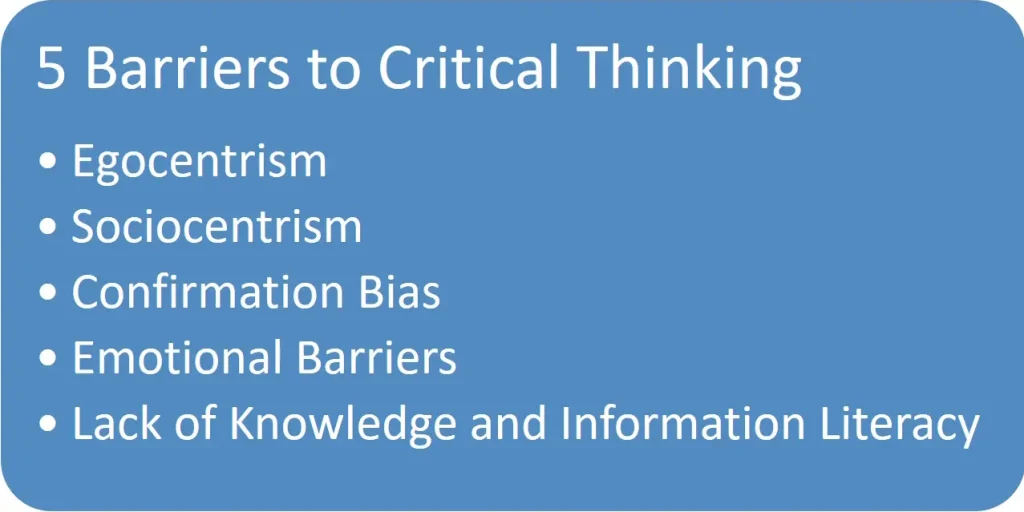Barriers to Critical Thinking
Critical thinking is essential for making informed decisions and solving problems effectively. However, several barriers can impede our ability to think critically.
Cognitive biases and emotional reasoning can hinder critical thinking, objective analysis and problem-solving. Overreliance on tradition and social conditioning can also impede open-mindedness and rational inquiry.
They can be sneaky, like when we only listen to ideas that we already like or when we’re too scared to try new things because we might make mistakes. Sometimes, we might find ourselves just going along with what everyone else thinks, even if, deep down, we’re not sure it’s right. It’s like trying to see through a foggy window – we know there’s more out there, but it’s hard to see clearly.
Contents
5 Barriers to Critical Thinking
Despite its importance, several barriers can hinder individuals from thinking critically. Here are five significant barriers to critical thinking:

Egocentrism
Egocentrism involves seeing everything concerning oneself, which can hinder objective analysis. Prioritizing personal opinions over factual evidence, for example, can lead to biased conclusions.
Sociocentrism
Sociocentrism is the tendency to prioritize the norms and beliefs of one’s group over broader perspectives. This can lead to groupthink, where conformity overrides critical evaluation.
Confirmation Bias
Confirmation bias is the tendency to favor information that confirms preexisting beliefs and disregard contrary evidence. This can skew decision-making and hinder open-minded analysis.
Emotional Barriers
Strong emotions like fear, anger, or frustration can cloud judgment. Making decisions based on emotional reactions rather than logical reasoning can lead to poor outcomes.
Lack of Knowledge
A lack of relevant knowledge and information literacy can impede critical thinking. Without a solid knowledge base, it’s challenging to assess the validity of arguments or evidence.
Personal Anecdote
Consider John, who initially struggled with confirmation bias in his research. By actively seeking out and considering opposing viewpoints, John improved his ability to think critically and make well-informed decisions.
Expert Insights
Dr. Emily Johnson, a cognitive psychologist, states, “Recognizing and addressing our biases is crucial for developing strong critical thinking skills.”
Practical Tips:
- Develop Awareness: Be aware of biases and how they influence thinking.
- Seek Diverse Perspectives: Consider multiple viewpoints to avoid groupthink.
- Embrace Uncertainty: Accept that not all answers are straightforward.
- Enhance Information Literacy: Learn to evaluate and use information effectively.
Overcoming Barriers to Critical Thinking
Developing Awareness and Mindfulness
The first step to overcoming barriers to critical thinking is to become aware of them. Paying attention to what influences our thought processes allows us to recognize and address our biases and fears.
Embracing Uncertainty and Change
Embracing uncertainty and change is crucial in overcoming fear of failure and normalcy bias. This involves accepting that we don’t always know the answers and being open to new ways of seeing and doing things.
Enhancing Information Analysis Skills
Good critical thinking requires the ability to analyze and evaluate information effectively. This involves analyzing facts and data, considering the advantages and disadvantages of different perspectives, and developing a solution based on sound reasoning.
Fostering an Environment of Openness and Diversity
Creating an environment where everyone feels comfortable expressing their ideas and opinions is vital for overcoming groupthink. This encourages diversity of thought and promotes strategic thinking, leading to more innovative and effective solutions.
Social conditioning plays a significant role in shaping our critical thinking abilities, often in subtle yet profound ways. Here’s how it impacts us:
Formation of Beliefs and Biases
We are socialized from a young age through family, education, media, and culture, which instill initial beliefs, norms, and values. These early beliefs can create biases that filter how we perceive information. For instance, if someone is raised in an environment where certain ideas are considered “truths,” they might struggle to evaluate those ideas critically and objectively due to confirmation bias.
Conformity
Social conditioning often pushes individuals towards conformity. Society rewards those who fit into established norms and punishes or marginalizes those who challenge them. This pressure can limit one’s willingness to think critically or to question the status quo, fearing social isolation or ostracism.
Educational Systems
While education aims to foster critical thinking, its structure can sometimes do the opposite. Emphasis on rote learning, standardized testing, or a one-sided presentation of history can hinder the development of analytical skills. Conversely, systems that encourage questioning, debate, and exposure to diverse viewpoints can enhance critical thinking.
Media Influence
Media, including social media, shapes our perception of reality. Algorithms often present information that aligns with our existing views, creating echo chambers. This can decrease critical thinking, as individuals are less exposed to contradictory information that might challenge their beliefs.
Language and Thought
Our social environment can shape our language and limit or expand our thinking. For example, societies with more rigid gender roles might condition individuals to think in binary terms, potentially limiting nuanced or critical analysis of gender issues.
Cognitive Load and Complexity Avoidance
Social conditioning can sometimes lead to a preference for simple, clear-cut answers over complex, nuanced ones. This can be a defense mechanism against cognitive overload, but it reduces critical engagement with complex issues.
Emotional Conditioning
We’re often taught to react emotionally to certain stimuli (e.g., patriotism, consumerism). These emotional responses can bypass rational analysis, affecting how critically we approach information related to these topics.
Role Models and Mentors
Who we look up to or are mentored by can greatly influence our critical thinking. If our role models encourage questioning and skepticism, it fosters critical thinking. Conversely, if they promote acceptance without questioning, this can stifle it.
However, social conditioning isn’t universally negative for critical thinking. It can also provide:
- A Framework for Thought: Basic norms and values can serve as a starting point for critically analyzing and expanding.
- Community and Dialogue: Being part of a community can expose one to diverse thoughts and debates, which, if encouraged, can enhance critical thinking.
To counteract the negative effects of social conditioning on critical thinking:
- Self-awareness: Recognizing one’s biases and the source of one’s beliefs is crucial.
- Education and Exposure: Seeking out diverse perspectives and engaging with material that challenges one’s views.
- Practice: Actively questioning information, even or especially when it aligns with one’s views.
Conclusion: The Path to Better Thinking
Although overcoming barriers to critical thinking may seem difficult, it is an achievable goal. By being aware of the barriers, actively working to mitigate their effects, and continuously practicing and applying critical thinking strategies, we can enhance our thinking abilities.
This not only leads to better decision-making and problem-solving but also contributes significantly to the development of a person’s character and life. Let’s strive to overcome these barriers and harness the full power of critical thinking for our personal and professional success.
References:
- Johnson, E. (2021). Understanding Cognitive Biases. Cognitive Psychology Journal.
- Lee, M. (2020). Critical Thinking in Decision-Making. Harvard Business Review.
Boko Ducky, M.A. in Communication Studies, is a freelance writer with over 10 years of experience researching and writing about interpersonal communication, social psychology, and inclusive dialogue.






